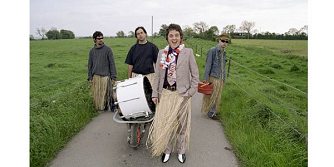Jesse Budd of Flipron Talks About BISCUITS FOR CERBERUS
This album wasn’t recorded in a proper studio. We dragged Greg Shepheard, his computer, a mixing desk, piles of electrical boxes with dials and switches, cables, microphones, stands, instruments, mattresses, big bits of cardboard, manky old blankets, bags of pasties and pies down to the house on the Somerset Levels where our drummer Mike lives with his partner Jill. It was as if some kind of parasitic music-making monster had gripped that little house in its grubby, rubberised electric tentacles for a week. The downstairs toilet had a microphone pointing at it and a guitar amplifier sitting on it. The sofa and the telly were shoved into the corner to make space for a drum kit. The dining table had an eight foot mixing desk covering it completely. We had to re-record some takes because the sounds of passing tractors had found their way through doors and windows, through the mattresses and cardboard sheets covered with blankets and old curtains, and into the microphones. We stayed there for a week and got the bones of the record down. We then moved out and took a smaller amount of equipment to Joe’s flat. We recorded the vocals and some steel guitar in a cupboard. We stayed there a few weeks mixing some B-sides along the way. We then moved everything into the house where Greg lives, recording accordions, clarinets, mandolins, harmonicas, dobros, egg-slicers and vocals sitting on his bed. Tambourines and percussion were recorded in the bathroom. We mixed it in the tiny box room in the evenings. It took months. We drank a whole range of beverages to help the mixing along the way, including Grappa, Slivovice, Somerset Cider Brandy, Unicum, Genever, some really quite good Cognac, and some decent Islay malt.

The album we made is a little different from the last one. For starters, we knew it was going to be released when we began recording it. We spent much longer making it sound good. This new album is similar to the last one in that there are many songs about old age pensioners, decrepitude and death, but the new album also takes a cautious look at themes of regret, conscience, psychological imbalance, true love, the passing of time and dogs. There are three songs relating to dogs and the album title includes a famous one from the world of Greek Mythology.
When you perform or record a song, it takes on a life of it’s own. It starts to mean very different things to different people. The notes below are purely to assert what my own intention was for them, how and why I wrote them, a few little bits about recording them, and the various histories of some of the older songs in the outside world. If you like the songs, it might just spoil them for you. If you don’t like them, it might give you a way in to enjoying them. So only read them if you really want to. Don’t feel obliged!
Cerberus Is As Cerberus Does
I was reading about Cerberus, the multi-headed, snake-tailed guard dog of Hades. I learned that far from being a savage, ferocious beast all the time, he was actually really friendly to you when you arrived, freshly dead, in Hades. He’d wag his snaky tails and pant eagerly with his great lolling tongues to welcome you in. It was if you weren’t dead that he got a bit tetchy, or if you were dead and thought that you might like to leave…. Anyway, the world would be overrun with zombies if it wasn’t for Cerberus, so I thought he deserved a little more positive press. Really I suppose the song is actually about trying to be open to what scares you, be it other people, elements of your own personality or possibly even the acceptance of your own mortality; but being open to the possibilities of those things having a value very different to the values we place upon them. I wrote the tune on a ukulele. Unlikely as it sounds, I was fiddling around trying to come up with something that sounded clean and tight like the Meters or the JBs, but it transformed itself all too easily into this great slab of lumbering monster psychedelic, which grew and grew until it crashed Greg’s computer every time we tried to work on it. It was getting to the point that we felt it might be cursed and Greg refused to go anywhere near it for a while. We finished it with a combination of violent, physical abuse of the computer, offerings of dog biscuits and muttered promises to the underworld. For this song John Dickinson lent us the electric sitar guitar that he made, like Frankenstein’s Monster, out of bits and pieces of dead guitars that were knocking around his workshop. It’s the only one of its kind. It’s ours now.
Ball & Chain
A song about regret. ” …memory made substance and tally of heart’s rot ” - a line from a 1929 Basil Bunting ode, sums up the intended sentiment of the lyric quite well.
The main melody the steel guitar plays I had originally imagined as a sort of dirty striptease theme, played on tenor sax. I’m still quite tempted to record an instrumental version with big swaggering horns on it and try to flog it to some nouveau-burlesque stripper type for use in their act…. But I can’t play the saxophone and I heard a recording of the great Roy Smeck playing really spooky, haunted sounding steel guitar on a song called ‘Lullaby Of The Leaves’ from the late 1920s, and that served as a template for this. The ‘ball’ of the ‘Ball & Chain’ that you hear thumping and scraping are the sampled sounds of Mike dropping a very large, empty plastic plant tub on a stone floor. The ‘chain’ is the sampled sound of Mike dropping a very large, rusty chain on a stone floor.
Youth Shall Never Beat Old Age In A Race
Yet another Flipron song about impending decrepitude and death! This song has offended some people who thought that it was some kind of ageist, pensioner-knocking rant. But it isn’t. I’d thought that using a fictional figure of Youth to race against Old Age was fairly obvious as a metaphor for growing older, but there we are. We live in a culture that takes everything literally. I particularly enjoy hearing Mike and Mark jamming hard to Joe’s brilliant Ramsey Lewis style funky piano boogie on this one, and the cataclysmic descending organ runs at the end of the race commentary section.
Big & Clever
This is a sort of partner song to ‘Ball & Chain.’ It’s song about someone who is deliberately avoiding confronting their regrets, their conscience and who thinks that they can get away with it. We recorded a demo of this ages ago with a chromatic harmonica, but then somebody gave me a CD of Naftule Brandwein playing this beautiful, deranged, spooky Klezmer clarinet in the 1930s. So I bought an old wooden clarinet on Ebay for £50 and worked out a simple part. The mandolin and piano take the main melody but I think the clarinet helps with the mood. The backing vocals at the end were intended to sound like a gathering of 19th Century Polish peasantry at a funeral party. Any success in this is mainly due to Mike, who’s contribution has a little authenticity not only because he actually has some Polish Gipsy blood in him, but because his whole demeanor is that of a 19th century Polish peasant at a funeral party. That’s when he’s in a good mood…..
Dogboy Vs. Monsters
The writing of this song began after reading a fantastic poem called Poem For The Saftey Of Lovers by John James from his book Dreaming Flesh. It begins:
“I can and do lie down with you amidst the venomous, charmed and safeguarded against all
harm in the unregarded instant..” It’s about true, reciprocal love and the almost magical feeling of immunity from any sense of harm that it can bring - I wanted to write a song in the same vein. I couldn’t help but compare people in this song with dogs though, because I love dogs with their crazy faces and their staggering sense of devoted loyalty, which I find really quite inspiring as a human being. Anyway I’ve long been trying to write songs about superhero dogs but I think I’ve finally laid that to rest with the Dachshund Detective character. I imagine him to be dressed like Inch-High Private Eye, in a belted raincoat and trilby. The bass/organ riff at the beginning would have been woofed by a canine choir of twenty exuberant mongrels if such a thing only existed, but as far as we know it doesn’t. Sampled dog barks would’ve been cheating.
The Flatpack Bride Of Possibilities
When we play this live, I always introduce this song by asking the audience to imagine that instead of meeting your partner or spouse in a normal fashion, you could order them from the internet or a catalogue, and they would be delivered to your house flat-packed, in kit form, ready for you to assemble. Things you assemble at home have a habit of turning out a little differently from the one on the illustration. But that is partly what this song is about in that the kind of person you might imagine yourself falling in love with is usually very different from the person you do fall in love with. And that even with the complete arsenal of your imaginative ability at your disposal, you could never dream up anything so extraordinarily amazing and complex as a ‘person’, especially the magical being that you fall in love with. The song is also about the way people have of being able to find beauty in other people and things that they never imagined they could. I love Joe’s piano solo at the end of the song. It’s fabulous. It was played on a vintage Hohner Pianette that he picked up cheap somewhere. By the way, if you didn’t know, a Merkin is a pubic wig.
**page*

Interlude: The Egg-Slicer, The Cheese-Grater, The Knife
About a year ago, my son, then aged 18 months, was fiddling in the kitchen with an egg-slicer, twanging the cutting wires to make a ‘pinging’ sound like a little angel’s lyre. As he was doing so it became apparent that the egg-slicer in question was, by pure chance, ‘tuned’ to some kind of weird A Minor key. Like many people, I’ve always been fond of Ennio Morricone’s spaghetti western soundtracks, intrigued by the way in which he could make a jaw harp, a recorder, some whistling and a group of cowboys making strange staccato grunts sound so utterly cool. So, having been fiddling with this egg-slicer until I’d found a little melody, I decided that I would also have a go at making an unlikely combination of sounds work together. I wanted it to sound like Ennio Morricone’s haunted kitchen at 3am…. So you’ve got plucked egg-slicer, a knife rasping on a cheese grater, a knife clanging on wobbling pans of water, some lids, whistling, bass pedals from an old Elka organ, and some dodgy keyboard sample used like glue to hold it all together. It’s on the album as a well earned interlude for the keen listener. A break from my relentless wordy ranting…
The End Of Summer
This is the very oldest song that we play and possibly the first song I wrote which I felt good about. There are a couple of early versions floating about somewhere on the internet, the better of which was recorded by Rat Scabies in his attic one warm autumn a few years ago, and which was used as the unlikely soundtrack of some very low budget TV show about skateboarding. We’ve updated the arrangement a little and had really good fun adding layers and layers of backing vocals, inspired directly by listening to Brian Wilson’s Smile album.
Bring Me The Head Of John The Baptist
There is a passage in Joris-Karl Huysman’s book Against Nature which describes in passionate detail a painting by Guatave Moreau of Salome dancing in some kind of shimmering saucy costume before King Herod. The description of the amazing painted scene and the story that inspired it planted a seed in my grubby little songwriter’s brain that could not be weeded out. The song is from the point of view of Herod and is largely about yielding to temptations that you know to be wrong but give in to anyway, the shabby excuses you make to yourself and the resulting regret, horror, blaming of other people and the distance you try to place between yourself and what you’ve done. I’m assuming that Herod has a conscience, albeit a weak, slimy little one. The chords started out as some kind of energetic, Latino shuffle but we wanted to get a colder, almost sterile feel to the music to help underline the dysfunctional motives behind Herod’s actions. To this end Joe added some spooky, discordant notes to the sequence which reminds us both of the theme tune to The Fall & Rise Of Reginald Perrin. The slower pace, the echoing vibraslap and twangy guitar makes us think of the incidental music to Bergerac, when Jim is staking out Charlie Hungerford’s place yet again to see what trickery the old goat is up to this time. If you didn’t see it first time around, don’t bother watching it on UK Gold, it’s not worth it…
Waltz Of The Monster Dogs
This tune was actually written by our piano and organ man Joe. He writes all manner of tunes under various pseudonyms, but this one seemed to have such an especially Flipron air to it that we just had to have it on the album. Joe named it in honour of a book beloved of Flipron called Lives Of The Monster Dogs by Kirsten Bakis. It’s the story of a race of dogs, surgically and genetically enhanced to speak, read books, have proper hands and wear clothes by a mad genius in the Canadian wilderness, who come to twenty first century New York. It is a unique and marvelous book.
Mingers In Paradise
Yet more stuff about old age, enduring love and death. With electric Hawaiian guitar, the middle section obviously owes a debt to mid-period Pink Floyd. Greg can’t bear Pink Floyd, but he likes this song. The vocal harmonies are happy accidents. None of us is a good enough singer for really tight harmonies, so half of these are mistakes that just happened to work.
Lion Lion Lion Lion Lion
This is another quite old song. I had a dream once in which I was forcibly and savagely buggered by a lion. If dreams could be auctioned on Ebay, I’ll wager this one would command quite a high price from buyers with a ‘special interest’ in animals. I’m not sure what Freud would have to say about my dream, but I’m not sure I’d be believe him anyway. I prefer a more Jungian interpretation, whereby something in my unconscious life is trying to connect (in this case via the somewhat attention grabbing medium of buggery) with my conscious life. That’s what the song is about. There is a Tom Raworth poem called Lion Lion, the last two lines of which are: “but nobody can understand the writing/in the book they found in the lion’s lair.” I like the idea of lions writing things down in books. Poems? Recipes? Confessions? The idea of terrifying man-eating monsters trying to communicate their feelings and thoughts with strange ill-formed alphabets… Marcel Fitzpatrick, who performs the screeching bowed double bass noises in the roaring section, played double bass in an early incarnation of Flipron.
Interlude: Clockwork Blues
I am rather partial to bit of old time Hawaiian Steel Guitar. The great players of the 1920s and 30s such as the great Sol Hoopii, a master musician whose recordings seem to have whole oceans of soul pouring out of them, and Jim and Bob The Genial Hawaiians, who made a very few really crazy, almost subversive recordings. Their version of ‘St Louis Blues’ is unlike any you might have heard. I wrote this tune in a style inspired by that late 20s sound. It was supposed to last exactly one minute, sixty bars at one bar per second in 2/4 time (or 120bpm in new money) but the sustained notes at the end take it a few seconds over. The windings and whirring come from clockwork toys, the ticking from an antique metronome Greg bought in Glastonbury market for a tenner, and the clanging is made by hitting the chime of a old cuckoo clock that sadly lost its tick many years ago.
The Man Who Was Eaten By A Pie
This is the final version of an old song that has undergone many changes, including a complete lyric rewrite. It’s looking at the same subject matter as ‘Lion Lion Lion Lion Lion,’ I suppose - the revenge of repressed areas of the unconscious. I also thought that pies were somewhat conspicuous by their absence in pop music, so I’m glad to have got one into this song. After the heavily Bowie influenced middle 8 section, it seemed that an over the top Mick Ronson-esque guitar solo was required. This was really fun to record. Amp cranked up high, fuzz pedals, wah wah… We recorded three takes and chose the one that made Greg and I laugh the hardest.
|
|

|

Midlake |
LATEST GALLERY IMAGES

Israel's Weapons of War 
Who Cares? |
|
|

